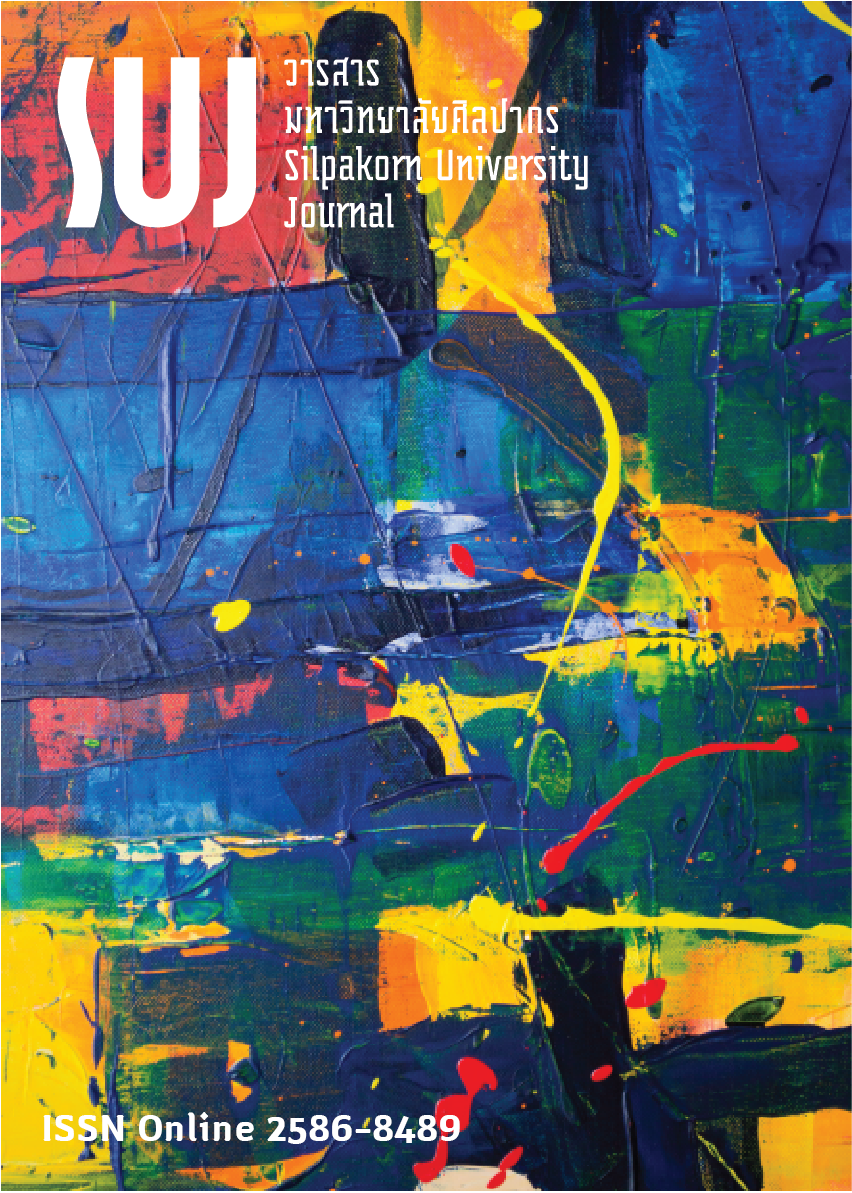การพัฒนาความสามารถในการใช้สำนวนภาษาอังกฤษของนักศึกษาชั้นปีที่ 1 ผ่านชุดบทเรียนออนไลน์ (The use of e-Learning lessons in improving first-year students’ knowledge of English expressions)
Main Article Content
Abstract
งานวิจัยเรื่องการพัฒนาความสามารถในการใช้สำนวนภาษาอังกฤษของนักศึกษาชั้นปีที่ 1 ผ่านชุดบทเรียนออนไลน์ มีวัตถุประสงค์ด้วยกัน 2 ประการ กล่าวคือ ประการที่ 1 เพื่อเปรียบเทียบระดับความรู้สำนวนภาษาอังกฤษก่อนและหลังการเข้าใช้ชุดบทเรียนออนไลน์ที่เหมาะสมกับนักศึกษาชั้นปีที่ 1 ประการที่ 2 เพื่อศึกษาทัศนคติและความคิดเห็นในการเข้าใช้บทเรียนทักษะสำนวนภาษาอังกฤษของผู้เรียน กลุ่มตัวอย่างที่ใช้ คือ นักศึกษาชั้นปีที่ 1 คณะอักษรศาสตร์ มหาวิทยาลัยศิลปากร วิทยาเขตพระราชวังสนามจันทร์ ประจำปีการศึกษา 2560 จำนวน 123 คน เครื่องมือที่ใช้เก็บข้อมูล ประกอบด้วย 1. ชุดบทเรียนออนไลน์ ทักษะสำนวนภาษาอังกฤษ ซึ่งผู้เรียนสามารถเข้าใช้ผ่านโปรแกรมออนไลน์มูเดิล (Moodle) 2. แบบทดสอบก่อนเรียนในรูปแบบของข้อสอบกระดาษ และแบบทดสอบหลังเรียนผ่านช่องทางออนไลน์ 3. แบบสอบถามข้อมูลของผู้เรียน และ 4. แบบสัมภาษณ์เพื่อการสัมภาษณ์แบบกึ่งโครงสร้าง จากนั้นผู้วิจัยได้วิเคราะห์ข้อมูลเพื่อคำนวณค่าทางสถิติ อันได้แก่ ความถี่ ร้อยละ ค่าเฉลี่ย ส่วนเบี่ยงเบนมาตรฐาน และการทดสอบค่า t แบบ dependent (t-test for dependent samples) ผลการวิจัยจากการที่นักศึกษาชั้นปีที่ 1 เข้าศึกษาชุดบทเรียนออนไลน์จากเว็บไซต์ https://onstreetenglish.wordpress.com ผ่านโปรแกรมออนไลน์มูเดิล พบว่า ประการที่ 1 ระดับความรู้สำนวนภาษาอังกฤษของผู้เรียนหลังการเข้าใช้ชุดบทเรียนออนไลน์สูงกว่าก่อนเข้าใช้อย่างมีนัยสำคัญทางสถิติที่ 0.05 ประการที่ 2 ความคิดเห็น และทัศนคติของผู้เรียนที่มีต่อการเรียนรู้ภาษาอังกฤษผ่านการใช้สื่อการเรียนออนไลน์เป็นไปในเชิงบวก อย่างไรก็ดีผู้เรียนส่วนใหญ่คิดว่าการเรียนภาษาอังกฤษในห้องเรียนยังมีความสำคัญ และการบูรณาการบทเรียนออนไลน์จะช่วยเสริมให้ผู้เรียนสามารถพัฒนาการใช้ภาษาอังกฤษได้ดียิ่งขึ้น
This research has two objectives: 1. to compare first-year university students’ knowledge of English expressions before and after the use of the e-Learning lessons in improving learners’ knowledge of English expressions and 2. to study the students’ attitudes and opinions towards the e-Learning lessons. The samples in this study are collected from 123 first-year students of the Faculty of Arts, Silpakorn University, Sanam Chandra Palace Campus, in the academic year 2017. The research instruments include 1. e-Learning lessons about English expressions on Moodle platform, 2. paper-based pretest of English expressions and online posttest of English expressions, 3. a questionnaire survey about the students’ information, and 4. the semi-structured interview form. The data were analyzed by frequency, percentage, mean, standard deviation, and dependent t-test. After the students self-studied the e-Learning lessons from https://onstreetenglish.wordpress.com on Moodle, the results show that 1. the students’ knowledge of English expressions after the e-Learning lessons was significantly higher than before the students used them at the 0.05 level and 2. the students’ attitudes and opinions towards e-learning English lessons were highly positive. However, most students think that learning English in the classroom is still important and this suggests that hybrid learning modalities might help them improve their English language proficiency better.
Downloads
Article Details

This work is licensed under a Creative Commons Attribution-NonCommercial-NoDerivatives 4.0 International License.
References
Bartz, W. H. (1979). Teaching Oral Communication in the Foreign Language Classroom: Language in Education: Theory and Practice. Virginia: The Centre for Applied Linguistics.
Boonchai, Prayoon, Phanharn, Suthi, Supawiwung, Suttipawn, Khwaengmek, Vipavadee, & Pansuksan, Kanokwan. (2017). Development of a Program for Enhancing Communicative English Language Abilities and Self-Confidence of Undergraduate Teacher Students Program in General Science (English Program), Valaya Alongkorn Rajabhat University under the Royal Patronage (การพัฒนาโปรแกรมเพื่อเสริมสร้างความสามารถในการใช้ภาษาอังกฤษ เพื่อการสื่อสารและความเชื่อมั่นในตนเองสำหรับนักศึกษาหลักสูตร ครุศาสตรบัณฑิต สาขาวิชาวิทยาศาสตร์ทั่วไป (หลักสูตรภาษาอังกฤษ) มหาวิทยาลัยราชภัฏวไลยอลงกรณ์ ในพระบรมราชูปถัมภ์). Journal of Curriculum and Instruction, 9(26): 121-131.
Canale, M., & Swain, M. (1980). Theoretical Bases of Communicative Approaches to Second Language Teaching and Testing. Applied Linguistics, 1: 1-47.
Chayarathee, Sutaporn. (2010). Results from the Development of Supplementary Computer Multimedia Materials for Practicing on the Internet to Improve the English Listening-Speaking Communication Skill of Students at Muban Chom Bueng Rajabhat University (ผลการใช้บทเรียนคอมพิวเตอร์มัลติมีเดียบนเครือข่ายอินเตอร์เน็ตฝึกฟัง-พูดภาษาอังกฤษของนักศึกษามหาวิทยาลัยราชภัฏหมู่บ้านจอมบึง). [Online]. Retrieved July 10, 2018 from http://doi.nrct.go.th/ListDoi/Download/174410/fb1a920e441482b80a94eb4f68becbc7?Resolve_DOI=10.14457/MCRU.res.2009.5
Itsarawat, Somkid. (1989). Self-directed Learning (การเรียนรู้ด้วยตนเอง). Non-formal Education, 11: 74.
Jindanulak, Taweesak. (2017). Teachers and Students in Thailand Education 4.0 (ครูและนักเรียนในยุคการศึกษาไทย 4.0). Electronic Journal of Open and Distance Innovative Learning, 7(2): 17-24.
Kanchanawasi, Sirichai, Pitanon, Taweewat, & Srisukho, Direk. (2008). Selecting Appropriate Statistics for Research (การเลือกใช้สถิติที่เหมาะสมสําหรับการวิจัย) (5th ed.). Bangkok: Chulalongkorn University Press.
Miles, M. B., & Huberman, A. M. (1994). Qualitative Data Analysis: An Expanded Sourcebook. Thousand Oaks, California: Sage Publications.
Morrow, K. (1981). Principle of Communicative and Methodology in Communication in the Classroom, Applications and Methods for Communicative Approach. London: Longman.
Palawong, Patcharee. (1993). Self-directed Learning (การเรียนด้วยตนเอง). Ramkhamhaeng University Journal, 9(special issue): 82-91.
Panklum, Anusit. (2009). Development of English Reading Instructional Package for Second Year English Program Students in Faculty of Education, Kamphaeng Phet Rajabhat University (การพัฒนาชุดการสอนเพื่อส่งเสริมทักษะการพัง-พูดภาษาอังกฤษของนักศึกษาโปรแกรมวิชาภาษาอังกฤษชั้นปีที่ 2 คณะครุศาสตร์ มหาวิทยาลัยราชภัฏกำแพงเพชร). Kamphaeng Phet: Kamphaeng Phet Rajabhat University.
Puengkaew, Naruemon. (2018). Using Moodle e-Learning to Develop Learning Achievement in Fundamental English 1st Year (การใช้โปรแกรม Moodle e-Learning ในการพัฒนาผลสัมฤทธิ์ทางการเรียนรายวิชาภาษาอังกฤษพื้นฐานชั้นปีที่ 1). In 2nd Innovation for Learning and Invention 2018 Conference Proceeding, (p. 65). Prathum Tani: Rajamangala University of Technology Thanyaburi.
Songsiri, Montha. (2007). An Action Research Study of Promoting Students’ Confidence in Speaking English. Doctoral dissertation, Faculty of Arts, Vitoria University, Melbourne, Victoria, Australia.
Suebkha, Sunate. (2010). Student’s Satisfaction Towards Learning Management System of Moodle e-Learning (ความพึงพอใจของนักศึกษาต่อการเรียนการสอนผ่านเว็บด้วยโปรแกรมมูเดิ้ล). Research report, Maejo University, Chiang Mai, Thailand.
Wonglekha, Fathina. (2015). Teaching Management in the Digital Age (การจัดการเรียนการสอนในยุคดิจิทัล). Daily News, p. 7.


